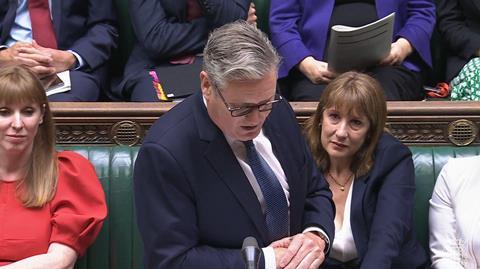Jemimah Wright reflects on the reactions to Rachel Reeves’s visible distress in Parliament and what this reveals about our expectations of emotional strength in leadership.

A few days ago, Rachel Reeves, the Shadow Chancellor, did something almost shocking by Westminster’s standards: she cried. During Prime Minister’s Questions on 2nd July, she faced intense scrutiny after her government reversed key welfare reforms, leaving a nearly £5 billion hole in their budget. Amid probing questions from Conservative leader Kemi Badenoch and lukewarm support from Prime Minister Keir Starmer at the dispatch box, Rachel Reeves appeared visibly emotional and wiped away tears. She later said to explain her crying, ‘I’d had a tough day.’
Many media outlets predictably leapt on her tears as a sign of weakness. But I believe showing our humanity is never weakness.
In the performative theatre that politics often becomes, we expect our leaders to be iron-clad
In the performative theatre that politics often becomes, we expect our leaders to be iron-clad, emotionally bulletproof and endlessly “resilient.” Yet in our effort to crown stoicism as strength, we risk something terrible - a world where we celebrate those who cannot feel, who are so hardened they no longer flinch at human suffering. That is not leadership; that is a kind of emotional poverty.
READ MORE: Tears of gold - why women’s stories matter
When the news broke that Rachel Reeves had wept, reactions varied. Many political commentators dissected the moment, asking whether it would harm her image or credibility. What do tears say about us that we still see them as something to hide?
It’s worth remembering that the shortest verse in the Bible is also one of the most powerful: “Jesus wept” (John 11:35). The Son of God, fully divine and fully human, was not ashamed to weep publicly at the tomb of his friend Lazarus. In that moment, He demonstrated for all time that tears are not a failure of faith or strength, they are a holy expression of compassion, grief, and solidarity.
READ MORE: I was moved to healing tears while watching new film Redeeming Love, it’s a story with God woven throughout
If the perfect, sinless Christ could weep in public, surely we can too. Rachel Reeves’s tears may have unsettled some, but they also remind us that there is still space in politics, and in life, for a human heart.
When we cry, we literally help our body regulate intense emotion and stress
Interestingly, even science backs this up. Researchers tell us there are three types of tears: basal tears (which lubricate the eye), reflex tears (which flush out irritants like smoke or onions), and emotional tears. It’s the last kind that make all the difference. Emotional tears contain stress hormones and natural painkillers like leucine enkephalin. When we cry, we literally help our body regulate intense emotion and stress.
Psychologists also note that crying activates the parasympathetic nervous system, helping us calm down. It’s why we often feel a strange relief after a good cry, as though a burden has shifted. Bottling up tears, on the other hand, can contribute to anxiety, depression, and even physical health problems. We were never designed to be so emotionally stunted that we couldn’t weep.
READ MORE: Standing up for faith in politics
So, what does this mean for us, watching a leader wipe her eyes at the dispatch box? It means, perhaps, that we are seeing a glimpse of true leadership — one that can still feel, can still break. A person who can’t cry in public is not automatically stronger; they may simply be more practised at numbing themselves to reality. But in times like these, when people are making impossible choices between heating and eating, do we really want politicians who are unmoved?
You may not agree with Rachel Reeves’s economic ideas, and politics should be about vigorous debate and holding our leaders accountable. But in her tears, she showed that she still cares. She has not been completely hardened by the machinery of Westminster. That, I believe, is something to respect.
In a culture that praises “keeping it together” at all costs, it is radical to let the tears flow. It is a reminder that we were created to feel deeply, and to stand with others in their pain. So to Rachel Reeves, I say this, thank you for showing us your humanity. May it remind all of us, left and right, that when our hearts become too hard to cry, that is when we are truly lost.




































1 Reader's comment